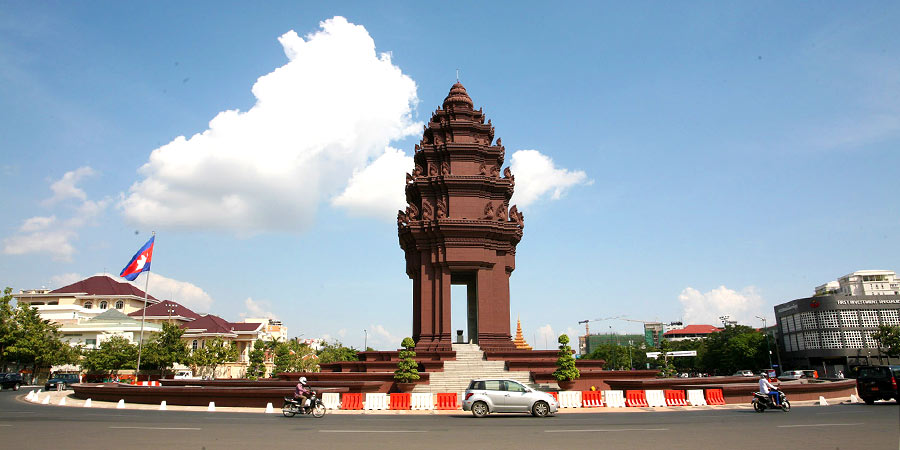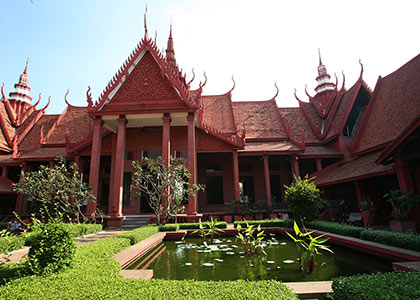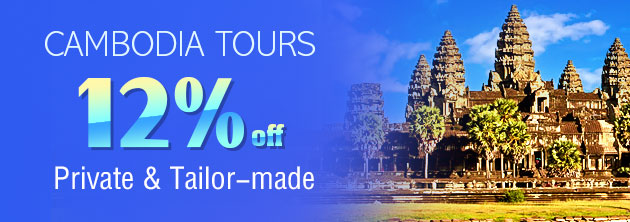Independence Monument, Phnom Penh
The Independence Monument is located in the center of Phnom Penh, the capital city of Cambodia. On November 9, 1962, the famous monument was inaugurated and opened for the national and international visitors to celebrate independence from the French protectorate.Importance of the Independence Monument
Every year, thousands of tourists visit the Independence Monument owing to its rich historical significance and architectural magnificence. The innovative design of the monument enables it to stand out from other historical buildings in the city. The monument is also considered to be a memorial place. It is dedicated to the patriots of Cambodia who fought against the French and lost their lives for the country.

|
Not only symbolizes the hard-earned freedom of Cambodian people from the French, it also stands as a symbol of religious secularism. This 37-metre (121 ft.) tall monument gets adorned with light during every national festival. The Royal or the high official often light the ceremonial flame under this monument to inaugurate the festivities. Hence, this monument stands as a symbol of integrity and national solidarity to the people of Cambodia.
Structure of the Independence Monument
The height of the renowned monument is 20 meter (66 ft.) and designed by a famous architect, Vann Molyvann, who was a Cambodian citizen. The memorial looks like a lotus similar to the structures that you will generally come across at Khmer and Angkor historical sites. Fountains and greenery surround the monument and also the area where it is located has a vast open park. If you visit the famous place at night, you will find that it is lighted up by red, blue and white lights – colors that feature in the Cambodian Flag.Construction
Independence Monument in Phnom Penh was constructed under the instructions of Prince Norodom Sihanouk in 1958. It features an alluring lotus design stupa that resembles the structure of the famous Banteay Srei, which is an important temple of Angkor time.This modern-day architectural excellence, the Independence Monument, stands as a symbol of the freedom of Cambodia from the French. Hence, besides carrying evidence of architectural excellence, this monument also boasts a history that narrates the saga of valor of the Khmer people.
How to Reach
You can reach the Independence Monument in multiple ways – by taxi, bus or foot.If you board a 7A-Orange Line Bus from Orussey Market Conjunction and pay only $0.5, then within 7-8 min you will reach the Independence Monument.
If you hire a taxi from the downtown area for a one-way trip, you need to pay $3-4 to traverse a distance of 2 km (1.2 mi) within 5 minutes.
Places to See Nearby

National Museum of Cambodia
|
The Royal Palace complex with silver Pagoda can be reached from the center quickly. Also, you can take a tuk-tuk and reach the National Museum of Cambodia to explore the rich culture and history of the region.
If you are willing to indulge in a little shopping, reaching the Russian market or the central market would not be a problem from Independence Monument.
To enjoy some great time with your family and children, head for the children's park named Koh Pick amusement park. To relax and unwind, you can also choose the golf course Phnom Penh and play some shots to enjoy your time. Take a taxi from Independence Monument and reach the golf course easily.
Quick Facts:
• Visiting Time: It stands right at the center of the city and is open to visiting for everyone all the time.• Photography: Visitors are free to take a photograph of the Independence Monument anytime
• Dedication: This monument is dedicated to the independence of Cambodia from the French
• Opening Date: The monument got opened in the year 1962
• Name of the designer: Vann Molyvann, a Cambodian architect designed the monument
If you are planning for a Cambodia holiday next season, make sure that you have included the Independence Monument in your list of places to see in Cambodia. Besides being an elegant structure, it is also an essential part of Cambodian heritage and culture.

